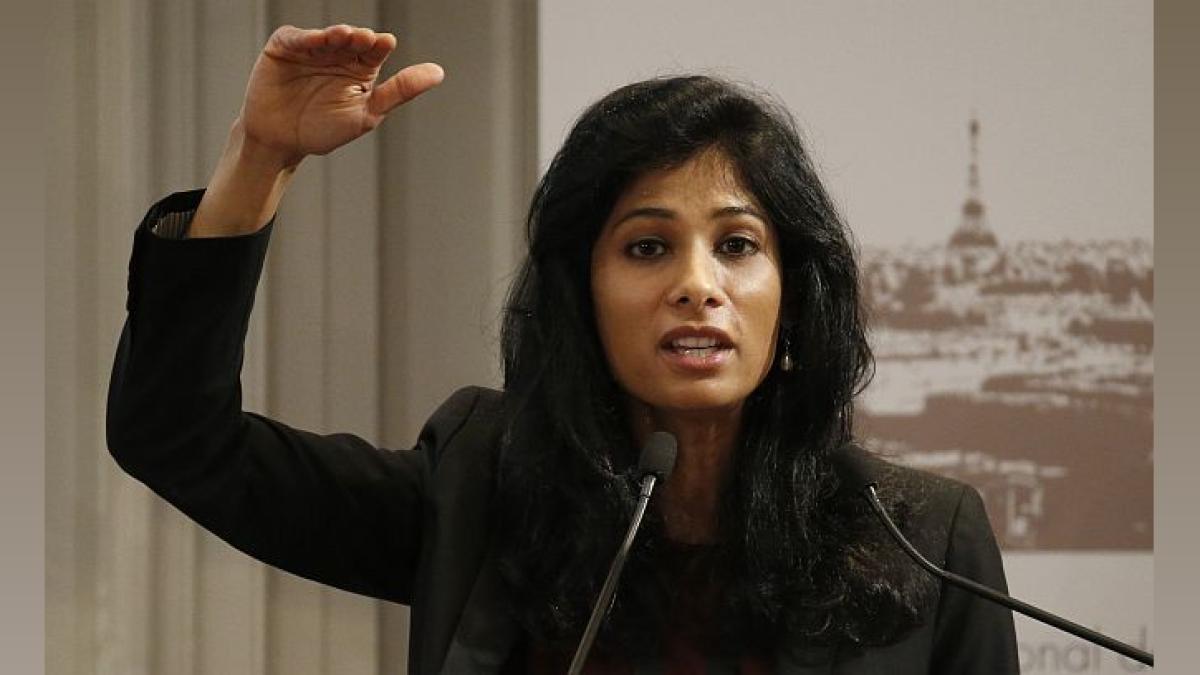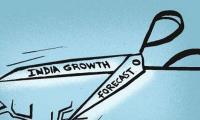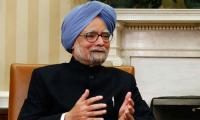India Needs More Reforms for Growth ''Jobs: Gita Gopinath
IMF's Gita Gopinath calls for more reforms in India to sustain growth, create jobs & reduce import tariffs for global supply chains.

Photograph: Kind courtesy Charles Platiau/ Reuters
New Delhi, Aug 17 (PTI) India will need to undertake a lot more reforms to continue its growth trajectory and make sure that enough jobs are created in the country, IMF deputy managing director Gita Gopinath said on Saturday.
Addressing an event here, Gopinath further said that India will be required to reduce import tariffs if it wants to be an important player in the global supply chains.
"The significant improvements have been made by the government over the years in terms structural reforms," Gopinath noted.
While noting that the world is in an environment where trade integration has been questioned, Gopinath said it is important for India to remain open for global trade.
"Tariff rates in India are higher than in its other peer economies. If it wants to be an important player on the world stage and an important part of global supply chains, it is going to require reducing those tariffs," the eminent economist said.
Gopinath said it is a tremendous aspiration to get to a developed country status but it does not happen automatically, and requires ongoing, consistent efforts, pretty broad scale, across many areas to deliver on that.
"India has grown well in terms of its overall growth rate, and at 7 per cent, it is the fastest-growing major economy in the world.
"The question is, how does one keep up the momentum and raise it further so that you can increase per capita incomes in India to get to being an advanced economy," she said.
To a question on taxation, she said India has parallels with other developing countries, where most of the tax revenue that is collected is indirect taxes and not direct taxes, not in the form of income taxes.
"We have been advising other developing countries too, that it is helpful to broaden the personal income tax base and so that you can have more income coming from there," she said.
Referring to the cut in corporate tax rate by the Modi government, Gopinath said although it was helpful it is less the tax rate that matters, but what matters is just making sure that there are no loopholes and there are not too many leakages that happen in terms of tax exemptions.
"It is very important to have sufficient progressivity in your tax system...making sure that you are (India) getting enough from your capital gains tax from your capital income tax is going to be critical," she said.
Gopinath also suggested that now there is better technology to implement property tax and this is again another area where work is needed.
To a question about countries grappling with very high spending needs, Gopinath said in the case of India, given its stage of development, increasing fiscal space is not going to come about through reducing overall spending.
"So India's overall expenditures are going to go up... the creation of fiscal space and any fiscal consolidation should happen through raising revenues.
"It should be through the channel, raising revenues to GDP," she suggested.
Noting that now, GST has begun to deliver good results, if India can further simplify GST tax rates and broaden its base with fewer exemptions, then the country can end up with raising about one percentage points of GDP in additional revenue through this on the expenditure side.
"And the revenue side, again, I think having a much more broader tax base for personal income tax is also going to be helpful," she suggested.
Gopinath also emphasised the need to implement labour reforms passed by Parliament in 2019 as it provides a nice blend between getting labour market flexibility but also protecting workers.
She also called for investing more in the health of people in the country, making sure that everybody has an equal opportunity to get to a high-income country status.
To a question on reforms in IMF, Gopinath said that the world in 2024 is very different from the world in 1944 when IMF was created, the kinds of challenges countries are facing are different from them.
"We're also looking at realigning quotas for countries so that again, it represents the world that we live in," she said.
Addressing an event here, Gopinath further said that India will be required to reduce import tariffs if it wants to be an important player in the global supply chains.
"The significant improvements have been made by the government over the years in terms structural reforms," Gopinath noted.
While noting that the world is in an environment where trade integration has been questioned, Gopinath said it is important for India to remain open for global trade.
"Tariff rates in India are higher than in its other peer economies. If it wants to be an important player on the world stage and an important part of global supply chains, it is going to require reducing those tariffs," the eminent economist said.
Gopinath said it is a tremendous aspiration to get to a developed country status but it does not happen automatically, and requires ongoing, consistent efforts, pretty broad scale, across many areas to deliver on that.
"India has grown well in terms of its overall growth rate, and at 7 per cent, it is the fastest-growing major economy in the world.
"The question is, how does one keep up the momentum and raise it further so that you can increase per capita incomes in India to get to being an advanced economy," she said.
To a question on taxation, she said India has parallels with other developing countries, where most of the tax revenue that is collected is indirect taxes and not direct taxes, not in the form of income taxes.
"We have been advising other developing countries too, that it is helpful to broaden the personal income tax base and so that you can have more income coming from there," she said.
Referring to the cut in corporate tax rate by the Modi government, Gopinath said although it was helpful it is less the tax rate that matters, but what matters is just making sure that there are no loopholes and there are not too many leakages that happen in terms of tax exemptions.
"It is very important to have sufficient progressivity in your tax system...making sure that you are (India) getting enough from your capital gains tax from your capital income tax is going to be critical," she said.
Gopinath also suggested that now there is better technology to implement property tax and this is again another area where work is needed.
To a question about countries grappling with very high spending needs, Gopinath said in the case of India, given its stage of development, increasing fiscal space is not going to come about through reducing overall spending.
"So India's overall expenditures are going to go up... the creation of fiscal space and any fiscal consolidation should happen through raising revenues.
"It should be through the channel, raising revenues to GDP," she suggested.
Noting that now, GST has begun to deliver good results, if India can further simplify GST tax rates and broaden its base with fewer exemptions, then the country can end up with raising about one percentage points of GDP in additional revenue through this on the expenditure side.
"And the revenue side, again, I think having a much more broader tax base for personal income tax is also going to be helpful," she suggested.
Gopinath also emphasised the need to implement labour reforms passed by Parliament in 2019 as it provides a nice blend between getting labour market flexibility but also protecting workers.
She also called for investing more in the health of people in the country, making sure that everybody has an equal opportunity to get to a high-income country status.
To a question on reforms in IMF, Gopinath said that the world in 2024 is very different from the world in 1944 when IMF was created, the kinds of challenges countries are facing are different from them.
"We're also looking at realigning quotas for countries so that again, it represents the world that we live in," she said.
You May Like To Read
TODAY'S MOST TRADED COMPANIES
- Company Name
- Price
- Volume
- Vodafone Idea L
- 8.10 (+ 18.94)
- 352105814
- GTL Infrastructure
- 1.50 (+ 7.14)
- 20982285
- G G Engineering
- 0.90 (+ 11.11)
- 20091512
- AvanceTechnologies
- 0.54 ( -8.47)
- 18780688
- YES Bank Ltd.
- 17.33 (+ 2.61)
- 14468025






 © 2025 Rediff.com India Limited. All rights reserved.
© 2025 Rediff.com India Limited. All rights reserved.